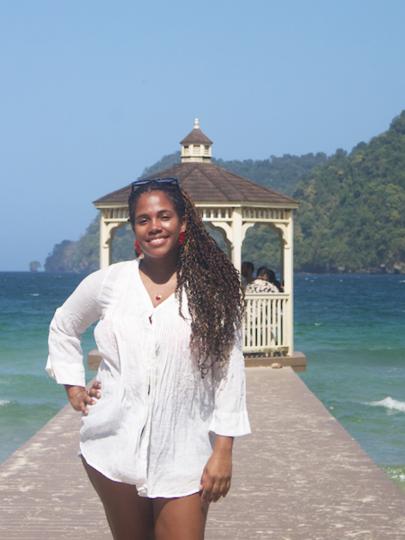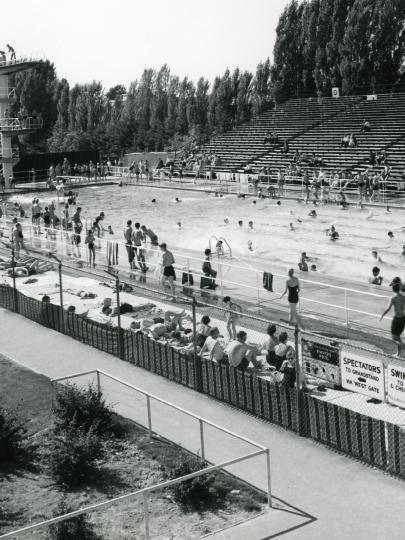Library Legends
Lionel Haweis (the surname rhymes with “noise”) was born in 1870 in Litchfield, England. He was the son of the Reverend Hugh Reginald Haweis and Mary Eliza (Joy) Haweis. Arts and culture were central to Haweis family life.
The Reverend preached at St. James Church, Marylebone, in London, but was even better-known as a scholar, author and musician. He travelled around the world and wrote and lectured on a wide variety of subjects – from Anglican Christianity to American humourists, from morals to violins. Reverend Haweis was also a close friend of Italian patriot Giuseppi Garibaldi, whom he met during military campaigns in Naples and Sicily in 1860.
Mary Eliza was an accomplished author and artist who published books for women and children and provided illustrations for her husband’s books. Her 1877 book Chaucer for Children was a standard textbook in English schools until well into the 20th century. In addition to Lionel, their children were son Stephen, an artist, and daughter Hugolin, a noted writer and singer in England.
Lionel was educated at King William's College on the Isle of Man, and at Marlborough College in England. For a short time he served on the editorial staff of the Daily Mail then, in his 20s, he left for Ceylon (now Sri Lanka) spending seven years there as a tea planter. He continued to write and in 1899 published Island Tales of Ceylon. It was during this period he began his life-long studies of mythology and literature.
For a short time he served on the editorial staff of the Daily Mail then, in his 20s, he left for Ceylon (now Sri Lanka), spending seven years there as a tea planter.
After returning to England and getting married, Haweis emigrated with his wife and daughter to Canada in 1907, eventually opening a photography studio in New Westminster. Later he moved to Vancouver and opened another business under the name of Rosetti Photographic Studios. The studio operated from 1910 to 1915, first on Pender Street and later on Robson Street. Among Rosetti Studios’ projects was a 1912 series of photographs of scenic viewpoints around Stanley Park, which have been digitized and mounted on-line by the UBC Archives.
In 1916 came another change in profession when Haweis joined the staff of UBC Library. By then Dorothy Jefferd had already been at the library for over a year. Born near Regina in 1889, she had attended convent school as a child. She later studied librarianship at the University of California. When she arrived at UBC in January 1915, she was tasked with cataloguing each book as John Ridington unpacked “his” library from shipping crates as they arrived at the old Fairview campus.
Jefferd would be responsible for cataloguing all of UBC Library’s first 300,000-plus volumes – unprecedented at the time and probably impossible today.
Over the following four decades Jefferd would be responsible (at first directly, then in a supervisory capacity as head of the Catalogue Division from 1940) for cataloguing all of UBC Library’s first 300,000-plus volumes – unprecedented at the time and probably impossible today. From its inception the library used the Library of Congress classification system, and as W. Kaye Lamb, Ridington’s successor as university librarian, later recalled:
... when Luther Evans, then Librarian of Congress, visited the campus, Miss Jefferd (who is a Roman Catholic) greeted him with a smile and the remark: “I'm delighted to meet you. For most of my life I've been governed by two infallibles – the Pope and the Librarian of Congress!”
Prim and proper, Jefferd was “[a] tiny figure in blue-grey English tweed accompanied by a large Airedale,” remembered Anne Smith, head of Reference Services and later university librarian, “who somehow managed to get plenty of space in a streetcar otherwise jammed to suffocation....” As small and frail-looking as she appeared, she was nevertheless a formidable personality. John Ridington, a formidable force himself, held her in high regard and would appoint her acting librarian during his absences. Together, Jefferd and Smith were a match for the authoritarian Ridington in discussions of library policy.
Her dedicated professionalism and strait-laced exterior, however, hid a well-developed sense of fun. Her generosity and quick wit were famous among university staff and students alike, as were the social events she enjoyed hosting. One year, as chair of the BC Library Association Catalogue Section, Jefferd hosted the annual meeting: a party, in a rowboat, with a bottle of champagne.
Her dedicated professionalism and strait-laced exterior hid a well-developed sense of fun.
Outside the library, Dorothy Jefferd’s passion was the theatre. She enjoyed reading plays as much as she did attending performances. For many years she served on the Advisory Board of the UBC Players’ Club with Frederic Wood and Dorothy Somerset. She often accompanied the club on its provincial tours as a chaperone to the students. One year, when one of the lead actors developed laryngitis, Jefferd nursed him through the rest of the tour with a flask of brandy and, prior to the last performance, “some kind of white powder” blown through a straw to soothe his throat.
Contemporary accounts of Lionel Haweis during his years at UBC present him as a rather dusty-looking figure, seemingly more at home among the dim bookstacks than among people. Anne Smith described him as “a tiny sprite with long flowing locks, in vest and shirt sleeves, climbing down one of those moveable floor to ceiling ladders in the old Fairview stacks, [with] tart comments when he reached the floor.” As one professor once remarked, “The university should pay him just to give atmosphere to the library.” His official position was variously loan clerk or accessions clerk, usually under Dorothy Jefferd’s supervision. Neither of these relatively junior job titles did justice to his unofficial stature at the university, to the breadth of his knowledge, or to his popularity among both faculty and students.
Like his contemporary, library custodian and museum curator William Tansley, Haweis could easily hold his own among supposedly more learned professors in informal chats about everything from philosophy to mythology, from literature to yoga. The resulting hours spent away from his assigned work would sometimes prompt a sharp comment from Dorothy Jefferd at the adjacent desk.
Jefferd nursed him through the rest of the tour with a flask of brandy and, prior to the last performance, “some kind of white powder” blown through a straw to soothe his throat.
One of Haweis’ official duties was to supervise the stack room. In those days the stacks were closed to undergraduates, and he would promptly see off any students who “accidently” found their way into the collections. Other duties, such as book repairs and sorting government documents, meant that he otherwise had little contact with students in the library. That did not stop him from forging close friendships with many of them outside his workplace, especially among those of a more artistic inclination:
Lionel Haweis was our confidant and friend, much closer to us than our professors.... The hospitality of him and his wife meant much to us, and very often a group sat around their fireplace talking the long night through. Regaled with coffee, we discussed life, death, and religion; art, literature, and music.... Mr. Haweis was immensely interested in and sympathetic to the young, earnest, and bookish people we then were. I do believe he did more to develop our literary creativity than any professor. – Anne (Anderson) Angus, Arts ‘23
Haweis was a long-time advisor and archivist to the Letters Club, established in 1920 for “the study of English as a joy.” Meetings were held every other week and consisted of papers read by members on appointed subjects relating to English literature. The presentations were followed by wide-ranging discussions fuelled by coffee and tea. Prizes were offered for the best papers presented during the school year. Beginning in 1928 Haweis funded an additional prize of $10 for the best oral presentation, arguing that there was not enough emphasis on speaking and delivery and that consequently half the value of the papers was lost. He also submitted poetry for a “chapbook” published by the Letters Club in 1931, and designed the cover for another volume published in 1935 as a memorial to one of their patrons, Professor F.C. Walker.
Outside the university Haweis was active in various other organizations, including the Vagabond Club and the Vancouver Little Theatre, and was the first honorary secretary of the Vancouver Overseas Club. He also continued to write, publishing two volumes of poetry entitled Little Lanterns; a translation of a Coast Salish legend, Tsoqalem, which won a prize from the Panton Arts Club of London; and a three-act dramatic play, The Rose of Persia (no relation to the comic opera of the same name). Many other works, including a translation of the Hindu epic The Mahabharata, were never published. He was keeper of the Haweis family archives, which his daughter later donated to the university. Retiring from UBC in 1939, Haweis continued to host dinners and other informal gatherings of friends, students, and colleagues at his Point Grey bungalow – occasionally entertaining them on his father’s Stradivarius violin – until his death in 1942.
Haweis occasionally entertained guests on his father’s Stradivarius violin
As head of cataloguing, Dorothy Jefferd eventually came to supervise a staff of 10 librarians and clerks. Upon Ridington’s retirement in 1940, she became the senior member of the library’s staff.
One of the more interesting events during this period was the visit of jazz bandleader Cab Calloway to the campus for a noon-hour concert in November 1948. After the show, Calloway presented the library with a copy of his Hepsters Dictionary (undated newspaper clipping, left). According to The Ubyssey, Jefferd accepted the book on behalf of the library, admitting that while she was not familiar with “jive talk” she looked forward to learning new expressions like “kicking the gong around” and “square.”
Another memorable episode, documented in the Librarian’s Report of 1950, was “Operation Harmac,” the cataloguing of the personal library of lumber baron and UBC Library benefactor H.R. MacMillan (HAR-vey MAC-Millan). There were some 2000 books, many of which Mr. MacMillan had promised to the library. The project required Jefferd and three other cataloguers – practically the entire Catalogue Division, complete with typewriters, catalogue-card stock, and the library’s 170-volume set of the Library of Congress catalogue – to work at the MacMillan residence for more than three weeks.
Jefferd accepted a copy of Cab Calloway’s Hepsters Dictionary on behalf of the library, admitting that while she was not familiar with “jive talk” she looked forward to learning new expressions like “kicking the gong around” and “square.”
After her retirement as head of the Catalogue Division in 1954, Jefferd went on a three-month trip to Italy, France, and England. Her expertise was so valued by the library, however, that upon her return she was quickly re-hired as senior cataloguer for another three years. After her final retirement, the University Senate paid her this tribute:
... Miss Jefferd joined the Library staff in January, 1915, before the Library had any books and, indeed, before the opening of the University.
Dorothy Jefferd's record of accomplishment has spanned the whole history of the University Library. She has seen it develop, and in no small measure helped it develop, from a “box of books” into a great academic institution. Her skill and devotion have made an important contribution to the growth of the University.
In 1961 Jefferd and her brother established the Dorothy M. Jefferd Scholarship, offered to students entering the School of Librarianship. An award of $200 was given annually to a student with outstanding qualifications for success in the field of librarianship. Another monetary tribute was later offered by H.R. MacMillan, in appreciation of her contributions: $500 towards a collection of biographies relating to World War I, a topic chosen by her.
Even during the numerous illnesses of her later years, Dorothy Jefferd continued her interest and involvement in cultural pursuits. Anne Smith recalled, “I have never heard her complain. The other day when she was looking at the current programme of the [Vancouver] Playhouse, she asked me to bring her Turgenev's A Month in the Country to re-read. But there was no grumbling because she couldn't see the performance.” She died in 1971.
Dorothy Jefferd and Lionel Haweis differed in many ways from each other. However, they shared a dedication to the library and through their work made important contributions to the development of the university. In addition, their friendships with staff and students, and their support for the artistic ambitions of their community, helped make UBC the cultural centre that it is today.

































